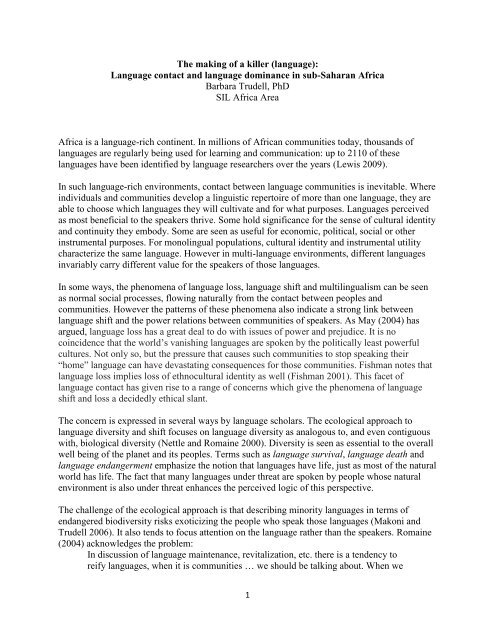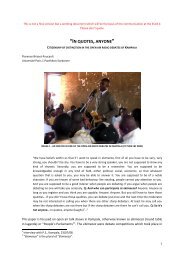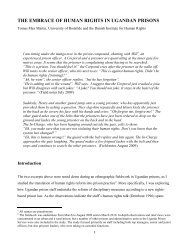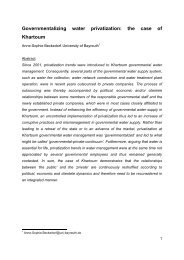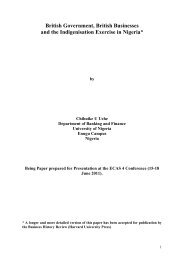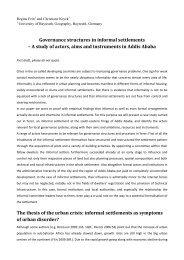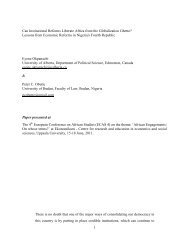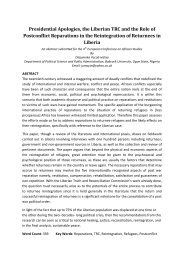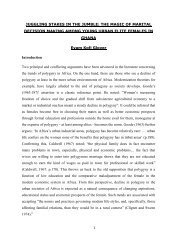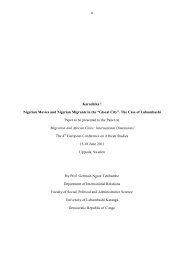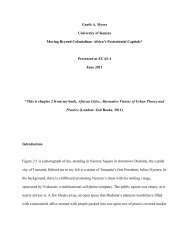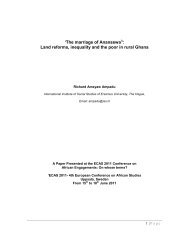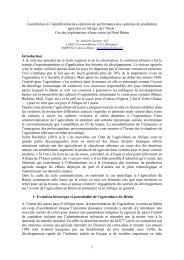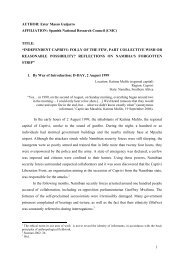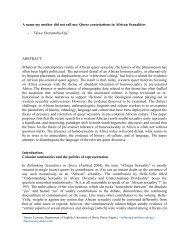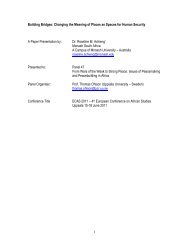Barbara Trudell - Full paper - The Nordic Africa Institute
Barbara Trudell - Full paper - The Nordic Africa Institute
Barbara Trudell - Full paper - The Nordic Africa Institute
You also want an ePaper? Increase the reach of your titles
YUMPU automatically turns print PDFs into web optimized ePapers that Google loves.
<strong>The</strong> making of a killer (language):<br />
Language contact and language dominance in sub-Saharan <strong>Africa</strong><br />
<strong>Barbara</strong> <strong>Trudell</strong>, PhD<br />
SIL <strong>Africa</strong> Area<br />
<strong>Africa</strong> is a language-rich continent. In millions of <strong>Africa</strong>n communities today, thousands of<br />
languages are regularly being used for learning and communication: up to 2110 of these<br />
languages have been identified by language researchers over the years (Lewis 2009).<br />
In such language-rich environments, contact between language communities is inevitable. Where<br />
individuals and communities develop a linguistic repertoire of more than one language, they are<br />
able to choose which languages they will cultivate and for what purposes. Languages perceived<br />
as most beneficial to the speakers thrive. Some hold significance for the sense of cultural identity<br />
and continuity they embody. Some are seen as useful for economic, political, social or other<br />
instrumental purposes. For monolingual populations, cultural identity and instrumental utility<br />
characterize the same language. However in multi-language environments, different languages<br />
invariably carry different value for the speakers of those languages.<br />
In some ways, the phenomena of language loss, language shift and multilingualism can be seen<br />
as normal social processes, flowing naturally from the contact between peoples and<br />
communities. However the patterns of these phenomena also indicate a strong link between<br />
language shift and the power relations between communities of speakers. As May (2004) has<br />
argued, language loss has a great deal to do with issues of power and prejudice. It is no<br />
coincidence that the world‟s vanishing languages are spoken by the politically least powerful<br />
cultures. Not only so, but the pressure that causes such communities to stop speaking their<br />
“home” language can have devastating consequences for those communities. Fishman notes that<br />
language loss implies loss of ethnocultural identity as well (Fishman 2001). This facet of<br />
language contact has given rise to a range of concerns which give the phenomena of language<br />
shift and loss a decidedly ethical slant.<br />
<strong>The</strong> concern is expressed in several ways by language scholars. <strong>The</strong> ecological approach to<br />
language diversity and shift focuses on language diversity as analogous to, and even contiguous<br />
with, biological diversity (Nettle and Romaine 2000). Diversity is seen as essential to the overall<br />
well being of the planet and its peoples. Terms such as language survival, language death and<br />
language endangerment emphasize the notion that languages have life, just as most of the natural<br />
world has life. <strong>The</strong> fact that many languages under threat are spoken by people whose natural<br />
environment is also under threat enhances the perceived logic of this perspective.<br />
<strong>The</strong> challenge of the ecological approach is that describing minority languages in terms of<br />
endangered biodiversity risks exoticizing the people who speak those languages (Makoni and<br />
<strong>Trudell</strong> 2006). It also tends to focus attention on the language rather than the speakers. Romaine<br />
(2004) acknowledges the problem:<br />
In discussion of language maintenance, revitalization, etc. there is a tendency to<br />
reify languages, when it is communities … we should be talking about. When we<br />
1
lose sight of people and the communities that sustain language, it becomes easy to<br />
argue as a number of critics have that there is no reason to preserve languages for<br />
their own sake.<br />
Other scholars focus on the political and legal injustice implied by the conditions that bring<br />
about language shift. <strong>The</strong> linguistic human rights paradigm, articulated most thoroughly by the<br />
linguist Stephen May, is built on the belief in the civil rights of all individuals within a society.<br />
Individuals‟ right to “retain their ethnic, cultural and language affiliations” (May 1999:46) is<br />
played out in the cultural community to which those individuals belong. Related to this discourse<br />
is the contention that, for marginalized communities of the world, progress in both education and<br />
development hinge on the use of the community‟s language; marginalization of that language<br />
thus is to block access to both learning and quality of life by the community (<strong>Trudell</strong> 2009;<br />
Pinnock 2009).<br />
A third approach to language loss and shift combines the discourses of ecolinguistics and<br />
linguistic human rights, radicalizing them both. This approach sees language as not only<br />
anthropomorphic, but as actually having agency; speakers of the language are seen primarily as<br />
victims (Mufwene 2005). Terms such as language wars, killer language and linguistic genocide<br />
characterize this approach, espoused by language scholars who are perhaps better described as<br />
language activists. This terminology highlights the judgment that language loss is morally<br />
wrong, regardless of the particular conditions of its social uses, and that linguistic diversity is<br />
inherently good. In many cases, proponents of this approach also identify particular languages as<br />
killer languages - primarily English (Phillipson 2009). Other international languages may be<br />
included in this deadly club, though for some concerned observers English poses a mortal threat<br />
to other world languages as well as local languages 1 – a kind of universal killer, so to speak<br />
(Phillipson 2003).<br />
Notwithstanding this ethically-charged discourse about particular international languages, the<br />
notion of language dominance is crucially important to language shift and language survival in<br />
<strong>Africa</strong>. In the parlance of the extreme activist, some <strong>Africa</strong>n languages could themselves be<br />
called “killer languages”: these languages, by virtue of their economic, social and political status,<br />
have taken on so many domains of use in multilingual contexts that the continued existence of<br />
other languages in the environment is in doubt. Batibo lists some 450 language of <strong>Africa</strong> which<br />
“have been responsible to varying degrees for causing language shift and death among the<br />
minority languages” (Batibo 2005:22). <strong>The</strong> sense of threat from a dominant language, as judged<br />
by the language activist or of the minority language community itself, confirms its “killer”<br />
character.<br />
Indeed, regional or national <strong>Africa</strong>n languages bear as much or more responsibility for language<br />
shift and death as the international languages do. Mufwene (2005:22) argues that urban <strong>Africa</strong>n<br />
vernaculars, rather than European colonial languages, are largely responsible for the<br />
endangerment of the “ancestral, ethnic languages” – and this more so in <strong>Africa</strong>n cities than in the<br />
rural areas. So despite the popularity of assigning “killer” status to European languages, this<br />
1 For example, the official website of the Academy of the French Language states that English represents a real<br />
threat to French.http://www.academie-francaise.fr/langue/index.html. Accessed 21 March 2011.<br />
2
practice does not reflect the reality of language competition and dominance in much of <strong>Africa</strong>.<br />
Displacement of one language by another in a given domain assumes that the languages are in<br />
competition in that domain. Where the array of languages available includes local languages,<br />
regional languages, national languages and international languages, international languages are<br />
not generally in competition with local languages for a given domain. Rather, the competition is<br />
between local languages, between the local and a regional or national <strong>Africa</strong>n language, between<br />
the dominant <strong>Africa</strong>n language and the international language, and/or between two international<br />
languages (Kamwangamalu 2010).<br />
So although the place of English and French in <strong>Africa</strong>n society is the subject of much debate, the<br />
likelihood of either language actually displacing local <strong>Africa</strong>n languages is not strong. Mufwene<br />
and Vigouroux (2008:2), in their important study of language and globalization in <strong>Africa</strong>, state<br />
that it is debatable whether the colonial European languages that now function as official<br />
languages in <strong>Africa</strong> are actually threats to the continent‟s indigenous languages, since the rural<br />
populations and the elite urban population have experienced them so differently.<br />
Globalization and language dominance<br />
Globalization has also been linked with the dominance of European languages, and English in<br />
particular (Phillipson 2003). Whether or not this is the case in other continents, the impact of<br />
globalization on language use in <strong>Africa</strong> is actually much more complex. Where globalization<br />
refers to the broad-ranging interconnectedness of different parts of the world, due to extensive<br />
networks of communication and transportation (Mufwene and Vigouroux 2008:22), its impact in<br />
<strong>Africa</strong> is largely limited to the urban, middle class or wealthy elite. For this segment of society,<br />
access to the globalization mechanisms of international languages, extended formal education<br />
using a Western-based curriculum, and ICT is indeed the key to national and international<br />
mobility.<br />
However, the reality is that this type of globalizing influence “has left most of the <strong>Africa</strong>n<br />
population on the margins” (Mufwene and Vigouroux 2008: 5). For that population, the more<br />
powerful globalizing forces take the shape of interdependencies which are played out in a<br />
complex local socioeconomic system. Mufwene and Vigouroux note that although local<br />
economic systems are influenced by worldwide economic trends, populations actually respond<br />
and adapt primarily to the local socioeconomic pressures that affect them directly (2008: 23).<br />
Thus for millions of people in <strong>Africa</strong>, the forces that shape language use are far more local than<br />
they are international. Globalization is indeed linked to “the expansion of particular languages at<br />
the expense of others” (Mufwene 2005:28), but these processes are played out locally, with the<br />
linguistic repertoire available to the local population.<br />
<strong>The</strong> role of language policy<br />
<strong>The</strong> dominance of a particular language or languages is usually traceable to official nationallevel<br />
language policy, what Shohamy (2006:45) describes as “the primary mechanism for<br />
3
organizing, managing and manipulating language behaviors”. Far from being objective or<br />
ideologically neutral, the laws and regulations that express official language policy reflect a<br />
range of social, economic and political agendas (May 2008). Such policies may target particular<br />
audiences, or the entire nation, or even other nations. (For example, see Renou 2002 on France‟s<br />
language policy regarding francophone <strong>Africa</strong>.)<br />
Official language policy in <strong>Africa</strong>n nations reflects the complex array of factors that shape<br />
national and local society: historical influences, socioeconomic aspirations, cultural identity and<br />
power relations. For a variety of reasons, the official language policies of most postindependence<br />
<strong>Africa</strong>n nations instated the colonial language – English, French, Portuguese,<br />
Spanish – as the official language of government, business and education (Wright 2004). A few<br />
<strong>Africa</strong>n nations did not follow this pattern, however, establishing an official or national <strong>Africa</strong>n<br />
language either alongside or instead of the European language. Kamwangamalu (2010:13)<br />
attributes what he calls “vernacularization” (the institution of an <strong>Africa</strong>n language as the<br />
dominant national language) in Tanzania, Ethiopia and Somalia, to the political will of the<br />
leadership of the time.<br />
Attention to local languages can also be seen in official language policy across <strong>Africa</strong>. <strong>The</strong><br />
Ethiopian government‟s enshrinement of local language rights in the current Constitution makes<br />
one of the strongest language policy statements imaginable. In Senegal, explicit recognition of<br />
local languages is allocated to the Senegalese government‟s Academy of National Languages.<br />
<strong>The</strong> Pan South <strong>Africa</strong> Language Board (PanSALB), established in 1995 by the South <strong>Africa</strong>n<br />
government, aims at the development all 11 official languages of the nation and the promotion of<br />
multilingualism in the nation. 2<br />
However language policy is more than simply a fixed, official edict, implemented without<br />
question or negotiation. Rather the dynamic, informal, negotiated side of language policy is<br />
described by Spolsky (2004) as growing out of people‟s own practices, ideologies and beliefs<br />
where language is concerned. Contestation and appropriation of official language policy take<br />
place at community, family and school levels, and reflects the realities of language choice and<br />
language attitudes „on the ground.‟ (REF FROM NEW BOOK) <strong>The</strong>se choices and attitudes, as<br />
much as any official regulation, shape the use of local, regional and international languages in a<br />
given context. <strong>The</strong> power of local language policy choices can be readily seen where national<br />
language-in-education policies are at variance with local values and beliefs, and parents as well<br />
as local education authorities choose to resist those policies where their children‟s education is<br />
concerned (<strong>Trudell</strong> 2007).<br />
Nuancing language contact, dominance and competition in <strong>Africa</strong>: Four case studies<br />
Influences on language dominance are thus overt as well as covert, local as well as national, and<br />
contextual rather than universal. Not only so, but language dominance is also highly dynamic - a<br />
socially shaped phenomenon reflecting changing power balances and economic opportunity as<br />
well as the fluidity of personal identities. Particularly in the multi-language contexts of <strong>Africa</strong><br />
where the cultural, pragmatic and ethical dimensions of language shift take on many different<br />
2 http://www.pansalb.org.za/pansalbhistory.html. Accessed 25 April 2011.<br />
4
facets, it is important to avoid a simplistic view of language contact and language shift. <strong>The</strong> four<br />
case studies below help to illustrate the political, social and cultural realities of language choice<br />
in <strong>Africa</strong>. At the end of each case study, one or two issues are highlighted which demonstrate the<br />
dynamism and unpredictability of language relations in these contexts.<br />
Tanzania<br />
Though the language debate in Tanzania has been portrayed as being between <strong>Africa</strong>n languages<br />
and English, in fact the debate is actually between kiSwahili and English. <strong>The</strong> attraction of the<br />
Tanzanian case for language activists in <strong>Africa</strong> is that it is one of the few instances in which the<br />
place of an <strong>Africa</strong>n language has been maintained in government and educational domains, often<br />
in direct competition with English. This has been primarily due to the strong support of<br />
government language policy over the years, particularly early in its nationhood. Upon Tanzania‟<br />
independence, Kiswahili was promoted as both a national symbol and a regional language of<br />
<strong>Africa</strong>. Wright (2004: 77) notes:<br />
Swahili was promoted on several accounts: its <strong>Africa</strong>n pedigree, its role as the<br />
medium of mobilization against colonialism, its indexical function as the<br />
language of freedom, socialism and the nation.<br />
Kiswahili was made the national language of Tanzania, and, in a reversal of the colonial<br />
language policy of English use in primary schools, Kiswahili was made the language of<br />
instruction in primary schools in 1967 (Roy-Campbell and Qorro 1997). English remained the<br />
language of instruction in secondary school.<br />
This policy of “Swahilisation” (Wright 2004: 79) successfully facilitated the nation-building<br />
agenda of the early government for about 20 years. Promotion of Kiswahili as a national<br />
language fostered a deep sense of nationhood that remains today. However, as Wright notes, “the<br />
situation has not remained stable”, as the various initiatives with which Kiswahili was associated<br />
were not able to deliver the promised economic prosperity. Not only so, but cultural and<br />
economic influences from the West have caused English competence to take on new importance<br />
for Tanzanians.<br />
Currently, the government website states that “the main feature of Tanzania‟s education system<br />
is the bilingual policy, which requires children to learn both Kiswahili and English.” 3 However<br />
the debate rages over which language actually yields the most desirable academic outcomes,<br />
given the low levels of English fluency among most Tanzanian teachers and students. In<br />
December 2010 the Minister for Education and Vocational Training announced the intention to<br />
make English the medium of instruction from grade three 4 , a move intended to enhance English<br />
fluency but which pro-Kiswahili educators believe will further hinder classroom learning. Two<br />
months later, a former MP made the national news with the opinion that Kiswahili should be<br />
made the medium of instruction through secondary school. 5<br />
However the energy of this debate, among scholars and Tanzanians themselves, masks the fact<br />
that up to 127 other languages are spoken as mother tongues by Tanzanian citizens (Lewis 2009).<br />
3 http://www.tanzania.go.tz/educationf.html. Accessed 4 April 2011.<br />
4 http://www.dailynews.co.tz/home/?n=15468. Accessed 4 April 2011.<br />
5 http://www.ippmedia.com/frontend/index.php?l=26268. Accessed 4 April 2011.<br />
5
Kiswahili serves Tanzania as a lingua franca (Fasold 1997); but fluency in the language is not<br />
universal, even after decades of official policy that has privileged KiSwahili tremendously over<br />
other Tanzanian languages. Linguist Casmir Rubagumya (2007) argues that those who speak<br />
ethnic community languages (ECL), but not Kiswahili, could number as high as 10% of the adult<br />
population – with a far higher number among young children entering school, since they have<br />
had no chance yet to learn kiSwahili as a second language.<br />
Rubagumya argues that these non-speakers of kiSwahili are actually “semi citizens” of Tanzania:<br />
“Semi-citizens” are those individuals who have access to neither English nor<br />
Kiswahili. <strong>The</strong>y can only function in domains where an ECL is used. For this<br />
reason, this group is excluded from domains where Kiswahili or English are used.<br />
<strong>The</strong> inability to exercise their rights as Tanzanian citizens has to be mitigated<br />
through a third party. For example, they would need somebody to help them<br />
during general elections because they are unable to read and write. (p. 3)<br />
This marginalization of Tanzanian languages (and, by extension, their speakers) was not always<br />
a feature of language policy in Tanzania. Before independence, local languages had been used as<br />
the medium of instruction in early primary schools (Roy-Campbell 2001:21; Roy-Campbell and<br />
Qorro 1997:1). However this pro-local language policy for early primary school was embedded<br />
in an overall colonial policy imposing English, and so at independence support for kiSwahili was<br />
prioritized over either English or local languages.<br />
So it is that the vigorous promotion of Kiswahili as the vehicle of social and political<br />
transformation resulted in marginalization of the other Tanzanian languages from development<br />
and use in educational or public domains (Rubagumya 2007: 4). <strong>The</strong> impact on primary-age<br />
children, especially rural children, has been significant. Tanzanian scholar O-saki notes that<br />
“since 80% of Tanzanians live in rural areas, most children start learning about the world around<br />
them in the mother tongue, which is the <strong>Africa</strong>n tribal language” (O-saki 2005:50). He further<br />
observes that “in [the Tanzanian education] system, we have no first language learning, we give<br />
Kiswahili and English both a second language status, and ignore the first language completely”<br />
(ibid.) In these cases young school children are not learning in their first language, to the<br />
detriment of their academic achievement in the early primary years – and probably affecting their<br />
later learning as well.<br />
In this context, these questions (among others) arise:<br />
Whether Kiswahili will be able to maintain its official, national status in an environment<br />
where English is highly esteemed but English fluency is low;<br />
whether Tanzanian national identity, shaped over the past decades as a Kiswahilispeaking<br />
identity, is now secure enough to allow the expression of other Tanzanian ethnic<br />
and linguistic identities.<br />
Senegal<br />
Since its independence, French has been the official language of Senegal. Indeed, the<br />
Francophone movement of the 1960s was spearheaded by Senegalese scholar President Leopold<br />
Senghor, among other West <strong>Africa</strong>n leaders (Wright 2004). Until the 1980s, knowledge of<br />
French was the key to economic advancement in Senegal. McLaughlin (2008:165) notes that<br />
6
“although knowledge of French during this recent period was not a guarantee for social and<br />
economic advancement, the door to such opportunities was closed to those who did not master<br />
the language.” However McLaughlin observes that an important economic shift took place in the<br />
late 1980s, as many Senegalese started to explore new trade and other business opportunities<br />
both within and outside of <strong>Africa</strong>. English took on greater instrumental value in this context. At<br />
the same time, the diminished perceived value of French made way for an increase in the<br />
perceived value of Wolof, a language of wider communication in Senegal, spoken as a first<br />
language by about 1/3 of the Senegalese population (Lewis 2009). Wolof took on quasi-formal<br />
status as „the first <strong>Africa</strong>n language of Senegal‟. LePage‟s view in the late 1990s (1997: 58) was<br />
that Wolof "unites people in their <strong>Africa</strong>n culture" in Senegal.<br />
However this increased dominance of Wolof has encountered active resistance from other<br />
Senegalese language communities. One of the best known of these has been among the Pulaarspeaking<br />
community, which has supported a Pulaar-language literacy and literature program for<br />
many years. One of the primary motivations for this program is the defense of the Pulaar<br />
language and culture against larger and more dominant languages, most obviously French<br />
(Hutchinson, 2006). But according to program director Sonia Fagerberg-Diallo, the real driving<br />
force behind the program has been the resistance of the Pulaar people to linguistic and cultural<br />
domination by the Wolof:<br />
As long as Wolof remained a spoken lingua franca which was chosen for practical<br />
purposes by the speakers themselves, using it never posed a problem. But in<br />
recent years there have been organized attempts to promote it as the official<br />
national language, in place of or equal to French. . . . This prospect of a „„threat‟‟<br />
has given the ethos of a „„cause‟‟ to Pulaar literacy, in which becoming literate is<br />
a way of asserting cultural identity on a national scale. (Fagerberg-Diallo 2001:<br />
160)<br />
<strong>The</strong> shift from French-Pulaar tension to Wolof-Pulaar tension has been attributed in part to<br />
diminished white-collar employment opportunities in Senegal, a situation in which French is less<br />
instrumentally valuable than Wolof (Carrington 1997). However this shift in prestige from<br />
French to Wolof appears to have triggered a much more vigorous opposition from speakers of<br />
other Senegalese languages than was ever mounted against the French language. Among other<br />
minority language communities such as the Noon, Saafi and Mankanya, anti-Wolof sentiment is<br />
not hard to find (<strong>Trudell</strong> and Klaas 2010). Members of these language communities express fear<br />
of the imposition of Wolof language, culture and religion on their own communities. Resistance<br />
takes the form of active language committees, literacy classes in the local language, and<br />
participation in both state- and civil society-sponsored language development bodies.<br />
In this environment, the Senegalese government has established an Academy of National<br />
Languages. Languages, mandated to officially recognize local languages which can show<br />
sufficient linguistic development to qualify as “codified;” once codified, these languages may<br />
legally be used as languages of instruction in primary schools.<br />
Minority languages are being recognized by the national government through a process<br />
called codification, in which the Ministry of Education officially attests that an unwritten<br />
language has been developed into a written language. Up to 17 Senegalese languages<br />
have been so recognized. <strong>The</strong> process requires extensive linguistic research as well as<br />
community mobilization. (<strong>Trudell</strong> 2008:339)<br />
7
It should be noted that this official recognition has significant impact on a community's<br />
self-identity. An official with the Catholic Education Service for the Diocese of Thies,<br />
Senegal told the author that “codification dynamizes the language; we could see a<br />
stabilizing of cultures, and a valuing of people for their ethnic identity” (ibid.)<br />
<strong>The</strong> language ecology presented here brings to mind these questions, among others:<br />
Given that Senegal has up to 33 languages, will the Academy of National Languages be<br />
willing to recognize that many?<br />
What will codification of other languages actually mean for the dominance of Wolof in<br />
future?<br />
Cameroon<br />
Due to its unique colonial heritage, Cameroon is the only <strong>Africa</strong>n nation to have officialized both<br />
French and English at independence. <strong>The</strong> use of the two languages as linguae francae defines<br />
two distinct geographical regions of the country, between which significant political tension has<br />
existed over the years. In fact, as Awasom (2004) has observed, the francophone-anglophone<br />
relationship in Cameroon is primarily geographical and sociopolitical, not linguistic, in nature.<br />
<strong>The</strong> national government and the national commercial interests are predominantly francophone,<br />
and it is clear to English-speaking Cameroonians that fluency in French is necessary for nationallevel<br />
advancement in academics, commerce or government (Chumbow and Bobda 1996).<br />
Discontent over this perceived inequity continues to contribute to a separatist sentiment on the<br />
part of some (Wolf 1997:424; Toh 2001).<br />
In this language environment of contact and conflict between these two high-status languages<br />
little policy space has been left for the elevation of a Cameroonian language to regional or<br />
national status. Some degree of attention has been given to the status of Cameroonian languages<br />
in the last 20 years however. In 1982, the Cameroonian government endorsed both official<br />
language bilingualism (French and English) and the promotion of minority languages as well<br />
(Tadadjeu 1990:20). In 1986, President Paul Biya wrote in his monograph entitled Communal<br />
Liberalism:<br />
I rather regard our linguistic diversity as a cultural privilege. In the face of this linguistic<br />
multiplicity, we should operate at two levels - the ethnic and the national. At the ethnic<br />
level we should encourage the development of the national languages which are the<br />
privileged mediums of ethnic cultures. . . . It is therefore necessary to allow all our<br />
linguistic values to flourish as an indispensable prelude to the enhancement of a<br />
national cultural heritage (Biya 1986:104).<br />
<strong>The</strong> National Forum on Education endorsed the 14-year-old multilingual education program,<br />
PROPELCA (Operational Research Project for Teaching in <strong>Africa</strong>n Languages), in May 1995;<br />
this endorsement is now part of the Law of the Orientation of Cameroonian Education, passed in<br />
1998. In a further step, the new constitution of January 1996 "committed the Cameroonian nation<br />
to protecting and promoting national languages" (Tadadjeu 1997:23).<br />
However the government has so far been slow to match pro-Cameroonian language rhetoric with<br />
actual resources for language development, and so the literally hundreds of Cameroonian<br />
languages are in roughly the same position as far as language policy is concerned. Interestingly,<br />
this situation is seen as helping to maintain the power balance between the various ethnic<br />
8
communities; as Fasold (1997:260) remarks, “the fear that ethnic particularisms might endanger<br />
national unity remains strong among the governing class.” This fear has some basis, since<br />
attempts to elevate one of the local languages over the others have historically met with quite<br />
sharp reaction from other language communities (Keller 1969).<br />
However, Chiatoh (2006:103) also argues that the laissez-faire policy of the national government<br />
where the development of local languages is concerned has actually resulted in a significant<br />
degree of what he calls “private initiative” in language development: the collaboration of local<br />
communities, private education providers, universities and international NGOs to develop and<br />
use Cameroonian languages for learning and development. Advocacy on behalf of Cameroonian<br />
language development is taking place, primarily in the context of the universities and NGOs. For<br />
example, Chia (2006) makes a case for the importance of Cameroonian languages to the success<br />
of national development initiatives such as AIDS campaigns, improving agricultural output,<br />
grater political participation, and so on.<br />
In this language environment, questions such as these arise:<br />
As English gains leverage over French in <strong>Africa</strong> and elsewhere (see section below), what<br />
will be the impact on the Cameroonian political environment?<br />
What might move the Cameroonian government to act decisively and intentionally to<br />
implement the pro-MT policy statements in its governing documents?<br />
Ethiopia<br />
<strong>The</strong> recent history of language policy in Ethiopia provides yet another example of a major<br />
<strong>Africa</strong>n language that exists in competition with both international and local languages (Heugh et<br />
al 2006; Benson et al 2010). Until 1955, formal education in the country was dominated by<br />
English-language instruction. <strong>The</strong> Constitution of 1955 made Amharic the official language of<br />
the country; by 1958, Amharic was the language of instruction for primary schooling. Clearly<br />
this was good for the large Amharic-speaking population of the country; and indeed, the move<br />
could been seen as removing an international language from its position of prestige in the<br />
country, and implementing what Kamwangamalu calls “decolonization of the curriculum” with<br />
an <strong>Africa</strong>n language as medium of instruction (2010: 3).<br />
However, not all of Ethiopia‟s citizens felt empowered by this move. As Heugh et al write:<br />
this language policy met with opposition on the grounds that it favored the use of<br />
only one language throughout the country; among the 80 other language<br />
communities of the country, this was seen as an attempt at linguistic and cultural<br />
assimilation. (p. 44)<br />
Opposition to Amharic-medium instruction among other language communities continued until<br />
the new coalition government came into power in 1991. <strong>The</strong> new government immediately<br />
proclaimed the right of every ethnic group in Ethiopia to use and develop its languages and<br />
cultures – including as a medium of instruction in primary school. Amharic was relegated to<br />
“third language” status, after the local language and English. (p.44)<br />
<strong>The</strong> ignominious fall of Amharic from its position of national prestige is a reminder that the<br />
politics of language are driven by powerful motivations. In an even more dramatic demonstration<br />
9
of this fact, Getachew and Derib (2006: 57) describe an ill-fated language policy decision made<br />
in 1999:<br />
A political decision to form a blended language called Wogagoda (from [the<br />
related languages] Wolayta, Gamo, Gofa and Dawro) and introduce it into the<br />
primary school education resulted in burning of textbooks worth 40 million birr,<br />
death of seven people, transfer of hundreds of teachers, and chaos that resulted in<br />
the demolition of infrastructures and even hotels.<br />
<strong>The</strong> four languages involved are mutually intelligible to some degree, but the speakers of the<br />
four identity themselves as quite distinct. This notion of a “blended language” offended their<br />
sense of identity and linguistic integrity. Protests and even riots ensued; and in the end, the<br />
initiative was abandoned as each of the four language communities decided to develop its own<br />
language as medium of instruction.<br />
In this language environment, questions such as the following arise:<br />
Is decentralized implementation of education policy sustainable?<br />
Will the larger and more powerful local languages dominate the smaller ones such that<br />
education provision becomes the privilege only of those more powerful languages?<br />
A further word on English and French in <strong>Africa</strong><br />
Despite the complexities of language contact and language choice described above, it is<br />
hard to overstate the impact of the French and English languages on <strong>Africa</strong>n education,<br />
identity and governance. For more than 100 years, fluency in these language giants has<br />
been key to success in formal schooling, social status, political power, and economic<br />
gain. Both carry largely instrumental value for their speakers; neither is seen as a real<br />
carrier of <strong>Africa</strong>n identity to any great extent. However the millions of <strong>Africa</strong>ns who do<br />
not speak these languages are locked out of a huge array of societal goods (Alidou 2003).<br />
As Kamwangamalu (2010:5) notes, “the social distribution of these languages remains<br />
very limited and restricted to a minority elite group.” For these reason, the increasing<br />
conflict between the French and English languages, particularly visible in so-called<br />
francophone <strong>Africa</strong>, is of great interest in <strong>Africa</strong>.<br />
<strong>The</strong> new balance of language influence can certainly be unsettling, perhaps nowhere more than<br />
in Rwanda, which after 12 years of an increasingly pro-English government stance, in 2008<br />
replaced French with English as the medium of instruction for the entire education system<br />
(Samuelson and Freedman 2010). <strong>The</strong> politically charged language environment within which<br />
this move was made has been shaped by tension between the Rwandan and French leadership<br />
over France‟s role in the 1994 genocide, and a more general sense of resentment on the part of at<br />
least some segments of society at the francophone colonial heritage they have experienced. On<br />
the front page of a major Rwandan news<strong>paper</strong>, journalist Ngango Rukara expressed the<br />
sentiment clearly in a recent article entitled France Should Pay for the Teaching of English in<br />
<strong>Africa</strong>n Schools:<br />
10
French is after all, nothing more than another local vernacular language on the<br />
European continent. 6<br />
However equally surprising, if not as dramatic or orchestrated, moves towards English and away<br />
from French can be found in other historically francophone countries such as Tunisia and<br />
Burundi. Ager (2001:119) notes that the growing choice of English is not usually the result of<br />
planned displacement of French or other languages; rather, people‟s motives for choosing<br />
English appear to be largely economic and pragmatic. Francophone government bodies such as<br />
the Organisation Internationale de la Francophonie (OIF) are attempting to fight the trend,<br />
decrying “the cultural and linguistic standardization [i.e. the spread of English] that is a<br />
consequence of globalization.” 7 Nevertheless, Mufwene (2005:34) observes a certain irony here,<br />
since<br />
La Francophonie has been quite aggressive in developing all sorts of strategies to<br />
promote French around the world. But it also looks like the harder they try the more<br />
evident it is that French cannot keep up with English.<br />
Given the decades of assimilationist language policy imposed by France on West <strong>Africa</strong>n<br />
(ex-)colonies, and given the profound dysfunction which imposition of the French<br />
language has meant for formal education in West <strong>Africa</strong> (Alidou 2006; <strong>Trudell</strong> 2011), it<br />
is difficult to find much sympathy for the replacement of French by English in <strong>Africa</strong>n<br />
government, business and education systems. And indeed, in some ways the instrumental<br />
status of both of these international languages for most <strong>Africa</strong>ns makes them both far<br />
more vulnerable to language shift than people‟s first languages would be - easily taken<br />
on, and as easily discarded with the shifting of economic, social or political winds.<br />
Be that as it may, however, the entrenchment of these languages as languages of<br />
education or government still poses a significant threat to those <strong>Africa</strong>n languages that<br />
are demographically in the majority but politically minoritized. Kamwangamalu warns<br />
that, in this environment where the two language giants are competing for use in domains<br />
such as education, the future of <strong>Africa</strong>n indigenous languages could be bleak. He notes:<br />
Unless <strong>Africa</strong>n languages are seen as a commodity in which language consumers have an<br />
interest to invest, that is, unless these languages become an instrument for upward social<br />
mobility, their prospects will continue to be bleak, especially in the era of globalization<br />
(Kamwangamalu 2010: 2)<br />
In this view, the personal and local domains of use will not be sufficient to maintain or increase<br />
the long-term viability of <strong>Africa</strong>n languages. And in this context, one high-prestige language can<br />
be as threatening as another where the long-term survival of minority <strong>Africa</strong>n languages is<br />
concerned.<br />
Conclusion<br />
6 “France should pay for the teaching of English in <strong>Africa</strong>n Schools.” <strong>The</strong> New Times, Tuesday April 5, 2011.<br />
http://www.newtimes.co.rw/index.php?issue=13690&article=10101. Accessed 5 April 2011.<br />
7 Taking Action Together: Francophonie 2006-2009. http://www.francophonie.org/IMG/pdf/Agir_Anglais.pdf.<br />
Accessed 5 January 2011.<br />
11
Far from being autonomous linguistic processes, language contact and competition can be<br />
accurately understood only within the broader societal context which shapes language use. <strong>The</strong><br />
shifting nature of language relationships, including those described in this <strong>paper</strong>, are best<br />
explained in terms of local and more wide-ranging social, economic and political dynamics.<br />
.Political aims, played out at local, national and international levels, are key to the waxing or<br />
waning influence of certain languages over others. Thus the “killer” language phenomenon,<br />
where it does appear, comes about in particular contexts and is not reliably associated with any<br />
one human language.<br />
And as Mufwene (2005:45) has argued, the reality of language shift is that languages do not<br />
“kill” other languages; language shift is the result of conscious or unconscious choices made by<br />
speakers of the languages concerned. Language attitudes are key to language choices, but these<br />
attitudes are held by communities of speakers whose values and beliefs about language are open<br />
to influence. <strong>The</strong> dynamic – and even unpredictable – trajectory of language dominance and<br />
language choice reflects the responsiveness of language attitudes to changing environments.<br />
This fact has important implications for the potential impact of language activism, including<br />
language revitalization efforts and the promotion of local language use in formal and nonformal<br />
education.<br />
12
References<br />
Ager, Dennis. 2001. Motivation in Language Planning and Language Policy. Clevedon:<br />
Multilingual Matters Ltd.<br />
Alidou, Hassana. 2003. Language policies and language education in Francophone <strong>Africa</strong>: A<br />
critique and a call to action. In Sinfree Makoni, Geneva Smitherman, Arnetha F. Ball,<br />
and Arthur K Spears (eds) Black Linguistics: Language, Society and Politics in <strong>Africa</strong><br />
and the Americas. London: Routledge. Pp. 103-116.<br />
Awasom, Nico Fru. 2004. Language and citizenship in Anglophone Cameroon. Paper given at the Centre<br />
of <strong>Africa</strong>n Studies Annual International Conference, 19-20 May 2004, University of Edinburgh.<br />
Batibo, Herman. 2005. Language Decline and Death in <strong>Africa</strong>: Causes, Consequences and<br />
Challenges. Clevedon: Multilingual Matters Ltd.<br />
Benson, Carol; Kathleen Heugh; Berhanu Bogale; and Mekonnen Alemu Gebre Yohannes. 2010.<br />
<strong>The</strong> medium of instruction in the primary schools of Ethiopia: A study and its<br />
implications for multilingual education. In Kathleen Heugh and Tove Skutnabb-Kangas<br />
(eds.), Multilingual Education Works: From the Periphery to the Centre. Hyderabad:<br />
Orient BlackSwan. Pp. 40-83.<br />
Biya, Paul. 1986. Communal Liberalism. London: MacMillan Publishers.<br />
Carrington, Lawrence. 1997. Social contexts conducive to the vernacularization of literacy. In<br />
Andrée Tabouret-Keller, Robert LePage, Penelope Gardner-Chloros and Gabrielle Varro<br />
(eds). Vernacular Literacy: A Re-Evaluation. Oxford University Press. Pp.82-92.<br />
Chia, Emmanuel N. 2006. Rescuing endangered Cameroonian languages for national<br />
development. In Emmanuel Chia (ed), <strong>Africa</strong>n Linguistics and the Development of<br />
<strong>Africa</strong>n Communities. Dakar: CODESRIA Pp. 115-128.<br />
Chiatoh, Blasius Agha-ah. 2006. Barriers to effective implementation of multilingual education<br />
in Cameroon. In Emmanuel Chia (ed), <strong>Africa</strong>n Linguistics and the Development of<br />
<strong>Africa</strong>n Communities. Dakar: CODESRIA. Pp. 103-114.<br />
Chumbow, Sammy Beban and Augustin Simo Bobda. 1996. <strong>The</strong> life-cycle of post-imperial English in<br />
Cameroon. In Joshua A. Fishman, Andrew W Conrad and Alma Rubal-Lopez (eds.). Post-<br />
Imperial English: Status Change in Former British and American Colonies, 1940-1990. Berlin:<br />
Mouton de Gruyter, pp.401-429.<br />
Fagerberg-Diallo, Sonia. 2001. Constructive interdependence: <strong>The</strong> response of a Senegalese<br />
community to the question of why become literate. In David R. Olson and Nancy<br />
Torrance (eds), <strong>The</strong> Making of Literate Societies. Oxford: Blackwell. Pp. 153-177.<br />
Fasold, Ralph. 1997. Motivations and attitudes influencing vernacular literacy: Four <strong>Africa</strong>n<br />
assessments. In Andrée Tabouret-Keller, Robert LePage, Penelope Gardner-Chloros and<br />
Gabrielle Varro (eds), Vernacular Literacy: A Re-Evaluation. Oxford: OUP. Pp. 246-<br />
270.<br />
Fishman, J. (2001) Why is it so hard to save a threatened language? In Fishman (ed.) Can<br />
Threatened Languages be Saved? Clevedon: Multilingual Matters. Pp. 1-22.<br />
13
Getachew Anteneh and Derib Ado. 2006. Language policy in Ethiopia: History and current<br />
trends. Ethiopian Journal of Education and Science 2.1, 37-62.<br />
Kamwangamalu, Nkonko. 2010. Vernacularization, globalization and language economics in<br />
non-English-speaking countries in <strong>Africa</strong>. Language Problems and Language Planning<br />
34.1, 1-23.<br />
Keller, Werner. 1969. <strong>The</strong> history of the Presbyterian Church in West Cameroon. Victoria<br />
[Limbe], Cameroon: Presbook.<br />
Heugh, Kethleen; Berhanu Bogale, Carol Benson, Mekonnen Alemu Gebre Johannes. 2006.<br />
LePage, R.B. 1997. Political and economic aspects of vernacular literacy. In Andrée Tabouret-<br />
Keller, Robert LePage, Penelope Gardner-Chloros and Gabrielle Varro (eds) Vernacular<br />
Literacy: A Re-Evaluation (pp.23-81). Oxford University Press.<br />
Lewis, M. Paul (ed.) 2009. Ethnologue. 16th ed. Dallas: SIL International.<br />
http://www.ethnologue.org.<br />
Makoni, Sinfree and <strong>Barbara</strong> <strong>Trudell</strong>. 2006. Complementary and conflicting discourses of<br />
language diversity: Implications for language planning. Per Linguam 22.2, 14-28.<br />
May, Stephen. 2008. Introduction to Volume I: Language policy and political issues in<br />
education. In Stephen May and Nancy Hornberger (eds) Encyclopedia of Language and<br />
Education, Volume 1. 2 nd ed. New York: Springer. Pp. xiii-xviii.<br />
May, Stephen. (2004) Rethinking linguistic human rights: Answering questions of identity,<br />
essentialism and mobility. In J. Freeland and D. Patrick (eds) Language Rights and<br />
Language Survival (pp. 35–53). Manchester, UK: St. Jerome Publishing.<br />
May, S. (ed.) (1999) Language and education rights for indigenous peoples. In May (ed)<br />
Indigenous Community-Based Education. Clevedon: Multilingual Matters. Pp. 42–66.<br />
McLaughlin, Fiona. 2008. <strong>The</strong> ascent of Wolof as an urban vernacular and national lingua franca<br />
in Senegal. In Cecile Vigouroux and Salikoko Mufwene (eds) Globalization and<br />
Language Vitality: Perspectives from <strong>Africa</strong>. London: Continuum. Pp 142-170.<br />
Mufwene, Salikoko. 2005. Globalization and the myth of killer languages: What‟s really going<br />
on? In Graham Huggan and Stephan Klasen (eds), Perspectives on Endangerment. New<br />
York: Georg Olms Verlag. Pp. 19-48.<br />
Mufwene, Salikoko and Cecile Vigouroux. 2008. Colonization, globalization and language<br />
vitality in <strong>Africa</strong>: An introduction. In Cecile Vigouroux and Salikoko Mufwene (eds)<br />
Globalization and Language Vitality: Perspectives from <strong>Africa</strong>. London: Continuum. Pp.<br />
1-31.<br />
Nettle, Daniel and Susanne Romaine. 2000. Vanishing Voices. Oxford: Oxford University Press.<br />
O-saki, K.M. 2005. Reflections on the problem of medium of instruction and interaction: A focus<br />
on science teaching and learning. In Birgit Brock-Utne, Zubeida Desai and Martha Qorro<br />
(eds), LOITASA Research in Progress. Dar es Salaam: KAD Associates. Pp. 41-54.<br />
Phillipson, Robert. 2009. <strong>The</strong> tension between linguistic diversity and dominant English. In Ajit<br />
Mohanty, Minati Panda, Robert Phillipson and Tove Skutnabb-Kangas (eds.)<br />
Multilingual Education for Social Justice. Hyderabad: Orient Blackswan. Pp. 79-94.<br />
14
Phillipson, Robert. (2003). English-only Europe? Challenging Language Policy. London:<br />
Routledge.<br />
Pinnock, Helen. 2009. Language and Education: <strong>The</strong> Missing Link. London: CfBT and Save the<br />
Children Alliance. http: www.savethechildren.org.uk<br />
Renou, Xavier. 2002. A new French policy for <strong>Africa</strong>? Journal of Contemporary <strong>Africa</strong>n<br />
Studies, 20.1, 5-27.<br />
Romaine, Susanne. 2004. Linguistic diversity, sustainable development, and the future of the<br />
past. Paper given at the Linguapax 2004 Conference on Linguistic Diversity,<br />
Sustainability and Peace, Barcelona, 2004.<br />
Roy-Campbell, Zaline Makini. 2001. Empowerment through Language: <strong>The</strong> <strong>Africa</strong>n Experience -<br />
Tanzania and Beyond. Asmara: <strong>Africa</strong> World Press.<br />
Roy-Campbell, Zaline M. and Martha Qorro. 1997. Language Crisis in Tanzania: <strong>The</strong> Myth of<br />
English vs. Education. Dar es Salaam: Mkuki Na Nyota Publishers.<br />
Rubagumya, Casmir. 2007. A Three-Tiered Citizenship: Can the State in Tanzania Guarantee<br />
Linguistic Human Rights? EdQual Working Paper No. 5.<br />
http://www.edqual.org/publications/working<strong>paper</strong>/edqualwp5.pdf/view. Accessed 24<br />
MArch 2011.<br />
Samuelson, Beth Lewis, and Sarah Warshauer Freedman. 2010. Language policy,multilingual<br />
education and power in Rwanda. Language Policy 9, 191-215.<br />
Shohamy, Elana. 2006. Language Policy: Hidden Agendas and New Approaches.London:<br />
Routledge<br />
Skutnabb-Kangas, Tove (2000). Linguistic Genocide in Education - or Worldwide Diversity and<br />
Human Rights? Mahwah, NJ & London, UK: Lawrence Erlbaum Associates<br />
Spolsky. Bernard. 2004. Language Policy. Cambridge: Cambridge University Press.<br />
Tadadjeu, Maurice. 1997. <strong>The</strong> challenge of language and education in <strong>Africa</strong>n development: A vision for<br />
the 21 st century. Paper presented at the Oxford International Conference on Education and<br />
Development 1997, September 11-15, 1997.<br />
Tadadjeu, Maurice. 1990. Le Defí de Babel au Cameroun. Yaoundé: University of Yaoundé I.<br />
Toh, Njah Peter. 2001. <strong>The</strong> Anglophone Problem: Prospects for Non-violent Transformation. Bamenda,<br />
Cameroon: self-published.<br />
<strong>Trudell</strong>, <strong>Barbara</strong>. 2011. Of gateways and gatekeepers: Language, education and mobility in<br />
francophone <strong>Africa</strong>. Paper presented at the AILA Conference on Mobility Language<br />
Literacy. Cape Town: 19-21 January 2011.<br />
<strong>Trudell</strong>, <strong>Barbara</strong>. 2009. Local-language literacy and sustainable development in <strong>Africa</strong>.<br />
International Journal of Educational Development 29 (2009), 73-79.<br />
<strong>Trudell</strong>, <strong>Barbara</strong>. 2008. Practice in search of a paradigm: Language rights, linguistic citizenship<br />
and minority language communities in Senegal. Current Issues in Language Planning<br />
9.4, 395-412.<br />
<strong>Trudell</strong>, <strong>Barbara</strong>. 2007. Local community perspectives and language of education in sub-Saharan<br />
<strong>Africa</strong>n communities. International Journal of Educational Development 27, 552-563.<br />
15
<strong>Trudell</strong>, <strong>Barbara</strong>. 2005. Language choice, education and community identity. International<br />
Journal of Educational Development, 25.3.<br />
<strong>Trudell</strong>, <strong>Barbara</strong> and Anthony Klaas. 2010. Distinction, integration and identity: Motivations for<br />
local language literacy in Senegalese communities. International Journal of Educational<br />
Development 30.2, 121-129.<br />
Wolf, Hans Georg. 1997. Transcendence of ethnic boundaries: <strong>The</strong> case of the Anglophones in<br />
Cameroon. Journal of Sociolinguistics 1.3 (1997), 419-426.<br />
Wright, Sue. 2004. Language Policy and Language Planning: From Nationalism to<br />
Globalisation. New York: Palgrave.<br />
16


